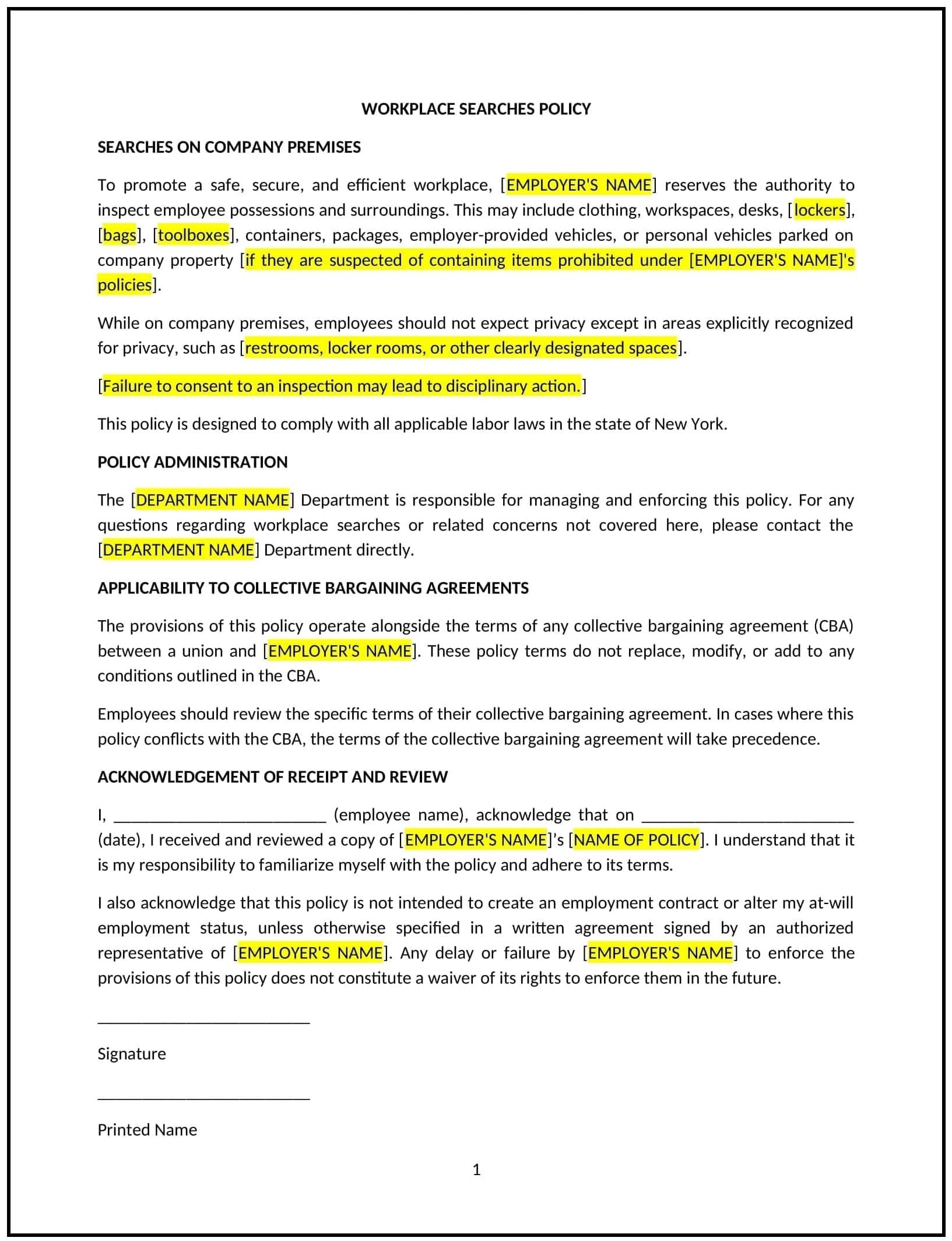Workplace searches policy (New York): Free template
Got contracts to review? While you're here for policies, let Cobrief make contract review effortless—start your free review now.

Customize this template for free
Workplace searches policy (New York)
This workplace searches policy is designed to help New York businesses establish clear guidelines for conducting searches of employees, their belongings, or their workspaces to ensure a safe, secure, and productive work environment. Whether businesses are managing concerns about theft, safety, or compliance with company rules, this template provides a structured approach to conducting workplace searches respectfully and legally.
By adopting this template, businesses can protect company property, prevent illegal activities, and maintain a respectful workplace environment while respecting employees' rights.
How to use this workplace searches policy (New York)
- Define the scope of searches: Clearly specify the types of searches that may be conducted, such as searches of personal bags, lockers, desks, or vehicles on company property, and the conditions under which they will occur.
- Establish search procedures: Detail how searches will be carried out, including who will conduct the search, when searches will occur (e.g., routine checks, based on suspicion), and how employees will be notified.
- Outline employee consent: Explain whether employees are required to consent to searches as a condition of employment, and the circumstances under which refusal to consent may result in disciplinary action.
- Provide guidelines for privacy: Ensure that searches are conducted in a way that respects employee privacy and dignity, such as conducting searches in private and ensuring only authorized personnel are involved.
- Set consequences for policy violations: Specify the actions that will be taken if an employee refuses a search or is found to be in violation of company policies, including potential disciplinary actions or termination.
Benefits of using this workplace searches policy (New York)
This policy offers several benefits for New York businesses:
- Protects company assets: By conducting workplace searches, businesses can deter theft and prevent the possession of illegal items or substances on company property.
- Promotes safety and security: Regular searches help identify potential safety hazards, weapons, or other dangerous items, ensuring a safer work environment.
- Reduces legal risks: A well-defined policy helps businesses stay compliant with employee rights laws while preventing legal issues related to privacy or wrongful searches.
- Supports company integrity: A clear workplace search policy demonstrates the company's commitment to maintaining a lawful and respectful workplace, strengthening its reputation.
- Ensures consistency: A structured approach to searches ensures that all employees are treated equally, avoiding inconsistencies or perceptions of favoritism.
Tips for using this workplace searches policy (New York)
- Communicate clearly: Ensure that all employees are aware of the policy and understand when and how searches may be conducted, and their rights regarding searches.
- Implement procedures consistently: Conduct searches according to the policy, ensuring that they are done respectfully and only when necessary.
- Document searches: Keep records of any searches conducted and the reasons for them, including any employee consent or refusal, to ensure transparency and protect the company from potential claims.
- Respect privacy: Ensure that searches are carried out in a manner that minimizes intrusion and respects employee privacy as much as possible.
- Review regularly: Update the policy to reflect changes in New York state laws, business operations, or employee concerns related to privacy and searches.